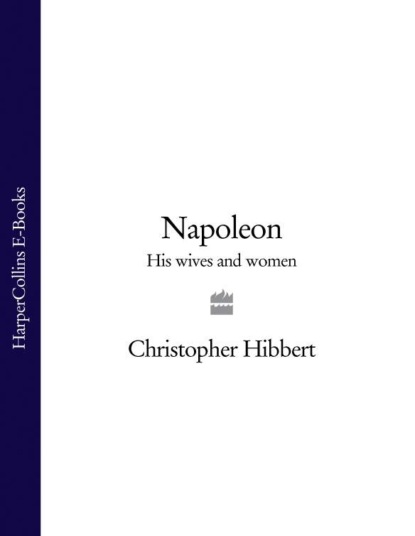По всем вопросам обращайтесь на: info@litportal.ru
(©) 2003-2025.
✖
Napoleon: His Wives and Women
Настройки чтения
Размер шрифта
Высота строк
Поля
Napoleon’s first visitor at the house was Paul Barras who remained with him until long after midnight. Even so, Napoleon rose early the next morning and sent a message to Talleyrand to say that he would call to see him at eleven o’clock. Upon his arrival he was pleased to find that Admiral Bougainville, the celebrated navigator, whom he had long admired, was also there. So was Germaine de Staël, whom he most certainly did not admire and to whom he ostentatiously declined to speak. His conversation with Talleyrand, however, at this, their first meeting, was mutually agreeable; and it was Talleyrand who, a few days later, at the Luxembourg Palace, presented General Bonaparte to the toga-clad Directors and other dignitaries as ‘the son and hero of the Revolution’.
To those who saw him here for the first time he did not present a particularly heroic figure. Short and pale, wearing a long, plain grey civilian overcoat buttoned under his chin, he appeared to have none of the panache expected of so splendidly victorious a commander. At pains to emphasize apolitical credentials, he was careful not to present himself as a latter-day Alexander. He had arrived at the Palace by way of back streets in a simple carriage in order to avoid the immense crowds which had gathered in the main thoroughfares to welcome him. As though prompted by him to emphasize his modest demeanour and disinterested patriotism, Talleyrand ended his speech by remarking upon Bonaparte’s ‘contempt for pomp, luxury and display’. ‘Far from fearing his ambition,’ Talleyrand said, ‘I feel that one day we may have to implore him to tear himself away from the calm of his studious retreat.’
Paul Barras, that year’s President of the Directory, struck a different note. Referring to the forces assembling on the coast for an invasion of England, he urged General Bonaparte to march to the banks of the Thames to ‘purge the world of the monsters’ who oppressed and dishonoured it: ‘May St James’s Palace crumble into dust. Your country wishes it. Humanity requires it. Revenge demands it.’
This was the kind of language which appealed to Napoleon and which he himself had employed in addressing the Army of Italy. Modest as he had contrived to appear since his return to France, he was a great showman at heart and, as showmen will, he greatly resented those who endeavoured to steal his thunder. On this occasion, towards the conclusion of his brief speech in acknowledgement of the words which had been spoken in praise of him, Mme Récamier stood up in her white dress to obtain a better view of him. Her appearance was greeted by ‘a long murmur of admiration’. Napoleon turned around to see what had caused it. The look in his eyes induced her to sit down again.
This was on 10 December 1797, five days after Napoleon’s return to Paris. Josephine had still not arrived. Nor had she come a fortnight later when five hundred guests had been invited to attend a reception and ball to be held at the Hôtel Gallifet in her honour. Consequently, the ball had to be postponed, entailing what François-Joseph Bellanger, the architect employed to supervise the Hôtel’s decorations, described as ‘a very large additional expense’ which included the cost of rented items that had to be replaced, ‘such as 930 trees’. But by 28 December she had still not arrived; and it was not until 3 January 1798 that she came home at last. The ball took place the following evening.
It was a glittering occasion. The guests of honour were deferred to as though they were already the emperor and empress they were to become; but neither appeared to be entirely at ease. Once again, Germaine de Staël – to Talleyrand’s intense annoyance – pushed herself forward to ask Bonaparte a series of irritating questions, ending with, ‘General, which woman could you love the most?’
‘My wife,’ he replied.
‘Of course, but which woman, alive or dead, do you most admire?’
‘The one who gives birth to the most children.’
He then pushed past her, and went into the dining room where the ladies sat at table while the men stood behind their chairs, Talleyrand himself attending to Mme Bonaparte who was less gracious than usual. Her mind, so some observers thought, was unusually distracted.
As he himself wished, Bonaparte and his wife now led a more or less retired life in the house in the rue de la Victoire, in marked contrast to life at the Palazzo Serbelloni in Milan where the poet, Antoine Arnault, had compared Bonaparte’s drawing room to the foyer of the Opéra in Paris. ‘Never did a military headquarters look more like a court,’ Arnault said. ‘It was the forerunner of the Tuileries.’ Dinner parties were held in the rue de la Victoire; but, apart from Barras and Talleyrand, political and military figures were rarely invited. Guests were more likely to be members of the French Academy of Sciences, which General Bonaparte had been invited to join – men such as Gaspard Monge, the mathematician, Claude-Louis Berthollet, the chemist, François-Joseph Talma, the actor, and the painter, Jacques-Louis David. Women were less in evidence, though Mme de Staël was to be seen there from time to time, clearly irritating Napoleon by her effusive talk.
On more than one occasion, when it was time for their guests to withdraw from the table for coffee and perhaps to listen to Antoine Arnault read one of his latest poems or to Étienne Méhul, the composer, sing one of his recent compositions, Josephine would gently tap her husband on the shoulder. Making one of those rare attempts at humour that would raise false laughter, the General asked his guests to note that his wife was in the habit of beating him.
At these dinner parties Napoleon ate hastily, as though late for some appointment. He rarely commented on the food and often seemed not to notice what was on his plate unless it happened to be runner beans which he would examine closely, once having been disgusted by a stringy one, part of which he had supposed to be a human hair.
He preferred plain food to rich and complicated fare and was particularly fond of a dish invented in Italy by his chef, Dunand, after the battle of Marengo when Napoleon, who never ate until the fight was over, found himself hungry and far from his supply wagons. A scavenging party was sent out and returned with three eggs, four tomatoes, six crayfish, a small hen, some oil, a few cloves of garlic and a saucepan. Dunand then created what became known as chicken Marengo and Napoleon, having relished it, said to him, ‘You must feed me like this after every battle.’
He usually had lunch alone at the Tuileries; but Josephine joined him for dinner at half past seven. The food at both meals was simple and the wine, usually a Chambertin, was well watered in Napoleon’s glass. Although guests were often invited to dinner with the Bonapartes, the meal lasted scarcely longer than lunch had done, being commonly over within twenty minutes. Eugène de Beauharnais was not the only guest to take the precaution of having a proper meal before being obliged to eat at his stepfather’s table.
At eleven or thereabouts the host would say, ‘Let’s go to bed.’ And he would go up to the bedroom he shared with Josephine, in winter giving a few kicks to the fire, a practice which naturally resulted in much damage to his shoes. He undressed speedily, putting on his nightshirt and a knotted handkerchief on his head, ensuring that all candles in the room were extinguished so that it was in total darkness by the time the warming pan had been removed from the bed.
If not awake already he was roused by his valet, Louis Constant, between six and seven o’clock. Having had a cup of tea or orange-flower water, he would look through his letters before having a very hot bath while Constant read extracts from the newspapers to him, occasionally breaking off to swing the door open and shut to let out the steam which was so thick that it obscured the print. After an hour or so Napoleon shaved carefully with an English razor, brushed his teeth with equal care, vainly endeavouring to get them white, discoloured as they were by his passion for liquorice. Then he cleaned his tongue with a scraper as was common practice in France if not elsewhere in Europe. After this the valet would splash eau de Cologne over his back while he himself rubbed it over his chest and stomach before putting on the underclothes which were changed every day. Eau de Cologne was also splashed on to a handkerchief which he placed in his right pocket, his snuff box going into his left.
He would then go to his desk to work, dropping papers for which he had no further use on the floor around him, making notes in his atrocious handwriting which he was often unable to decipher, preferring to dictate to his secretaries who had difficulty in keeping pace with the flow of his words.
Once a week, his librarian would be summoned to attend him with recently published books for him to glance through and he would throw on the ground or even into the fire ‘those which did not interest him, or which annoyed him, and putting one or two – rarely three – aside to read with greater attention’.
Constant and Napoleon’s other servants soon became aware that they must become accustomed to certain unchanging rituals and eccentricities, as well as to their master’s tiresome penchant for practical jokes: his insistence on blazing fires in summer and winter; the careful arrangement of the porcelain figures on his desk which he would pick up and fiddle with, from time to time breaking off an arm or a leg; his involuntary muscular twitching when concentrating on some problem, ‘the shrug of his shoulder’, as one of his staff described it, ‘accompanied by a movement of his mouth from side to side’; his annoyance if doors were left ajar and if servants entering the room did not open them only just enough to allow them to get through; and his persistent, almost life-long habit of pinching cheeks, ears and noses, sometimes so hard that the bruises on the flesh did not disappear for weeks.
15 ‘LA PUTANA’ (#ulink_40a6550e-baa2-56a5-898d-374f619d2083)
‘I would rather die than lead a life
that cannot be devoted to you.’
A FREQUENT GUEST at the Bonapartes’ dinner parties, Barras was closer to Napoleon than ever, far closer than any of the other Directors (all of whom, in varying degrees, were wary of him). Barras was also as intimate as ever with Josephine: one evening, when she had planned to have dinner at his house, her husband returned unexpectedly early from a visit to the Channel ports. ‘Bonaparte came back last night,’ she wrote to Barras’s secretary. ‘I beg you, my dear Botot, to tell Barras how much I regret not being able to dine with him tonight. Tell him not to forget me! You know, my dear Botot, my delicate position better than anyone else.’
Josephine also wrote, and in far more intimate terms, to Hippolyte Charles:
(#litres_trial_promo)
Joseph [her brother-in-law] had a long conversation yesterday with Bonaparte and afterwards he asked me if I knew Citizen Bodin and if I had procured for him the purveyor’s contract with the Army of Italy and if it was true that Charles was living at Citizen Bodin’s house at 100 faubourg St Honoré and if I went there every day. I answered that I knew nothing at all of what he was talking about and that, if he wanted a divorce, he only had to ask me…Yes, my Hippolyte, I hate all of them [the Bonaparte family]. You alone have my loving tenderness…They must see my despair at not being able to see you as often as I would like. Hippolyte, I will kill myself. I would rather die than lead a life that cannot be devoted to you. What have I done to these monsters?…They must see how I abhor them…I hate them all…But however much they torment me, they shall never part me from my Hippolyte…You alone have my love…Please tell Bodin to say he doesn’t know me, and that it wasn’t through me that he got the Army contract…
I will do my very best to see you during the day. I will send Blondin [a trusted manservant] to tell you what time I can get away to see you in the Parc Monceau. Goodbye, my Hippolyte, a thousand kisses as passionate and loving as my heart…My life is a constant torment. You only can restore me to happiness. Tell me that you love me, that you love only me. Send me 50,000 livres by Blondin out of the funds in hand. Collot [ Jean-Pierre Collot, a corrupt banker] is asking me for the money. Adieu, I send you a thousand tender kisses. I am yours, all yours.
Napoleon’s brother, Joseph, was not the only member of his family who had come to Paris. His wife, Julie, had come with him from Rome, where he had served for a time as ambassador; so had Julie’s sister, Désirée Clary, and so had packing-cases full of treasures and money which enabled Joseph to buy a fine country estate, the Château de Mortefontaine, as well as a splendid house in Paris, designed by Jacques-Ange Gabriel, architect of the Petit Trianon at Versailles.
Joseph’s brother, Lucien, a tall, pretentious man equally antagonistic to Josephine, was able to buy an extensive estate in the country from which he wrote long letters to Napoleon detailing Josephine’s real and supposed indiscretions. All their three sisters were, and continued to be, equally antagonistic; Elisa and Caroline frequently expressing their dislike and spreading malicious gossip, Pauline displaying similar animosity between visits to Josephine’s couturíères and bijoutiers, and the occasional enjoyment of the ‘old woman’s’ former lovers.
Napoleon’s mother was now also living in comfort in France, having abandoned the family house in Corsica, which, after returning to the island for a time, she had rebuilt, redecorated and refurnished with money sent to her by her son. She did not speak against Josephine so openly as her daughters did; and, presumably at Napoleon’s behest and probably at his dictation, wrote to her to say, ‘My son has told me of his happiness, which is enough to secure my approval.’ In private, however, she referred to Josephine as ‘La putana’, ‘the whore’.
The Bonapartes were far from alone in endeavouring to make trouble between Napoleon and Josephine. One day, Louise Compoint, Josephine’s maid who had accompanied her from Italy, came to see the General. She had lost her place, she told him, because Mme Bonaparte had objected to her sharing a bed with General Junot when they stopped for the night at inns. This, she said, was most unfair since Mme Bonaparte herself had seen to it that Captain Charles was with her in her carriage and he had spent the nights at the same inns.
Bonaparte questioned his wife about this. In an attempt to get her to confess, he remarked that of course if a man and a woman slept in the same inn it did not necessarily follow that they shared a bed. ‘No, no,’ Josephine repeated, bursting into tears which, for the moment, ended the questioning. Her husband, who seems to have paid little attention to Joseph’s accusations, seems not to have pursued Louise Compoint’s either, turning his attention to the next step in his career, an invasion of Egypt, proposed by Talleyrand, as a means of striking at one of the main sources of England’s wealth and threatening her route to India.
The time had not yet come, Bonaparte thought, to take steps nearer to power in France. He had attempted to enlist Barras’s help in getting himself elected a Director and then mounting a coup d’état, but Barras had not been encouraging. At the same time, Bonaparte was beginning to believe that an invasion of England was not practicable, while to remain in Paris, where many of those who had formerly been so ready to praise his achievements were now openly expressing the belief that he wished to make himself a dictator, was not a course to be recommended either.
He had also begun to fear that his life itself was in danger from an assassin’s knife in Paris. It was noticed that, as though in readiness for flight, he never took off his spurs, and that at public dinners his own servant kept a careful eye on the food he ate and the wine he drank.
He was depressed by the lack of encouragement received for Talleyrand’s proposal for a campaign in Egypt. Of the Directors only Barras supported him and he did so without enthusiasm. There was a risk, it was argued, that it might entail a war with Russia, as well as with the Ottoman Empire of which Egypt was a province. When Bonaparte gave his opinion to the Directors that the French navy was not strong enough for an invasion of England and that the great sum of money needed for it was not available, the Directors promised him more money. Exasperated by their reluctance to consider an invasion of Egypt, he threatened to resign. The Director, Jean-François Reubell, offered him a pen, inviting him to write there and then his letter of resignation. But the Directors well knew that he would not resign and, in the end, they submitted to his demands for the Egyptian adventure which he himself hoped would end in a speedy and decisive victory and enable him to return home with his reputation even further enhanced and the time ripe for the next step towards the fulfilment of his destiny.
While the preparations for the campaign were being made with the secrecy which was essential if Admiral Nelson’s fleet were to be kept in the English Channel, and while a Commission of Arts and Sciences, including artists and all manner of scholars from astronomers to cartographers and geologists, was being formed to accompany the expedition, Napoleon took Josephine to look for a suitable country house to which they could return when the campaign was over.
He could well afford to buy one. He protested publicly that, while commanding the Army of Italy, he had nothing but his general’s pay. But in addition to the large dowries he had given his two elder sisters and the money for the purchase of the rented house in the rue de la Victoire, he had found the means for the education of his youngest sister as well as his youngest brother at schools which were among the most expensive in France. Yet, even so, when Josephine was much taken with one of the country houses they saw, the Château de Malmaison – a house built on the bank of the Seine just outside Paris near Bougival in the early seventeenth century on the site of one burned down by the Black Prince, son of King Edward III – Napoleon decided he could not afford the price asked for it.
He had not yet made up his mind whether or not to take Josephine to Egypt with him. There were those who thought she did not want to go, that her professed desire to accompany him was characteristic make-believe. Yet there were also those who supposed that she was beginning to realize what a remarkable man her husband was and what a splendid future lay in front of him, even that, since she had grown to know him better, she was growing fond of him. Certainly, she pressed him to allow her to go with him to Egypt, all the more insistently when she saw how well his flagship, the Orient, had been fitted up and supplied (even to the extent of having his bed provided with casters so that he should not be troubled by the mal de mer from which he habitually suffered when at sea); and when General Alexandre Dumas called to see Bonaparte one morning while he and his wife, obviously naked beneath the sheet, were still in bed, he found her in tears. Bonaparte explained that she was upset because he had still not made up his mind whether or not to take her with him. In the end, he decided not to do so, at least until the convoy had managed to evade the enemy fleet: in the meantime she was to go to Plombières in Lorraine, to take a course of the waters of the spa which were said to be efficacious in cases of sterility.
Her husband set sail on 19 May 1798. The crossing to Egypt was expected to take about six weeks, allowing for the acquisition of the island of Malta and the treasure of the Knights Hospitallers on the way. For most of that time, Bonaparte rarely left his cabin. He did not suffer from seasickness as badly as he had feared he might; but most of the soldiers cramped below did so, their plight made worse by the stale water and weevil-infested biscuits of their daily fare.
He had brought an extensive library with him, and on most days his friend and secretary, Louis-Antoine de Bourrienne, read to him, generally from books of history, particularly of the history of the Islamic world. One day he asked Eugène de Beauharnais and General Berthier what they themselves were reading and was annoyed to discover they were both enjoying a novel. ‘Reading fit for chambermaids!’ he told them angrily. ‘Men should only read history.’ In the evenings, he talked about all manner of other subjects with his senior officers, discussing politics and French foreign policy, warfare and religion, the interpretation of dreams, the age of the world and how it might be destroyed, and whether or not there was life elsewhere in the universe.
When not talking of such matters, reading, or being read to he spoke about Josephine. ‘Passionately as he loved glory – both France’s and his own,’ Bourrienne commented, Josephine was almost constantly in his thoughts. ‘His fondness for her was close to idolatry.’
16 A CONVERSATION WITH JUNOT (#ulink_f58f6672-fbc0-5bee-8e4a-fd95afd8dcf1)
‘I was astonished to discover, that he was capable
of the most bitter jealousy.’
A FEW DAYS AFTER SETTING SAIL, Bonaparte decided to make arrangements to send a frigate to fetch Josephine to join him. He was missing her, and she, so she told Barras, was missing him. ‘I am so distressed at being separated from him,’ she wrote to Barras, ‘that I cannot get over my sadness…You know him and you understand how upset he would be at not hearing from me regularly. The last letter I had from him was very affectionate…He says that I am to rejoin him as soon as possible and I am making haste to finish the cure [at Plombières] so that I can be with him again very soon. I am very fond of him despite his little faults.’
But then the balcony of the pension where she was staying at Plombières collapsed into the street and she fell with it, injuring herself badly. Compresses and leeches were applied; she was given enemas and soaked in hot baths; but for weeks she remained in severe pain – unable, so she said, to ‘remain standing or sitting for ten minutes’ without causing agony in her kidneys and lower back. She told Barras that all she did was cry, and that he had no idea how much she suffered.
There was even worse to come. On 19 July 1798, as they walked together beside an oasis in the desert, General Junot confirmed to Bonaparte that Josephine was having an affair with Hippolyte Charles. Bourrienne, who had overheard Junot’s confidences, saw Bonaparte’s already pale face turn almost white. ‘If you had cared for me,’ Bonaparte said, striding up to him, ‘you would have told me about this before now… Josephine!…Divorce, yes, divorce. I will have a public and sensational divorce. I will write to Joseph and have it arranged…I can’t bear to be the laughing-stock of Paris…I love that woman so much I would give anything to have what Junot has just told me pronounced untrue.’ For years afterwards, thoughts of Josephine’s infidelity returned to distress him:
Napoleon never uttered Monsieur Charles’s name [Laure Junot wrote in her Mémoíres]. And he never allowed anyone else to mention it in his presence. He hated Charles; and I was astonished to discover that he was capable of the most bitter jealousy…One day when he was out walking with General Duroc, he squeezed his companion’s arm. His face had paled even beyond its usual pallor. Duroc was about to fetch help when Napoleon silenced him: ‘There’s nothing wrong with me, be quiet!’ A carriage had overtaken them and Napoleon had glimpsed Monsieur Charles inside. It was the first time he had caught sight of him since the Italian campaign.
Soon after learning about Josephine’s betrayal, Napoleon wrote to Joseph, asking him to have a country house ready for him to move into upon his return. He intended to be shut away in seclusion there for the winter. He needed to be alone, he said. He was ‘tired of grandeur’; he no longer cared about glory. At the age of twenty-nine he had ‘exhausted everything’.









